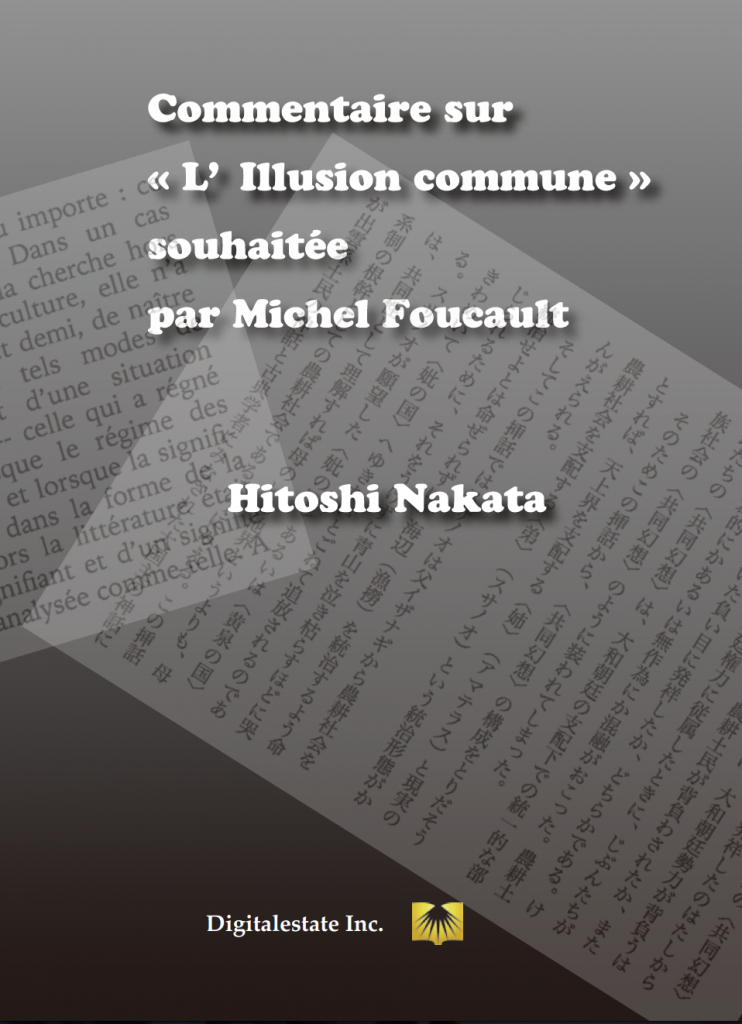Comment on L’Illusion commune wanted by Michel Foucault
This post is also available in:
 日本語 (Japanese)
日本語 (Japanese)  Français (French)
Français (French)
Comment on L’Illusion commune wanted by Michel Foucault
List Price: $13.00
6″ x 9″ (15.24 x 22.86 cm)
Black & White on White paper
104 pages
ISBN-13: 978-1544001579 (CreateSpace-Assigned)
ISBN-10: 1544001576
BISAC: Philosophy / Social
Paperback (Print on Demand)
To see URL click image of the book.
Comment
When Takaaki Yoshimoto wrote “The Common Illusion", he knew that the state is the community of illusion in the Western concept. Yoshimoto was surprised that the state had a narrower concept than the concept of society in the Western World, but this is not surprising, it is a common Western sense. Yoshimoto’s true sense of explanation should rather be read like that. The Japanese do not wake up by being caught by the illusion that the state is the community of destiny that surrounds the Japanese and that they can not escape, whereas in the western common sense the state and individuals are sometimes contradictory as different concepts. When he wrote “The common illusion," the revelation came down to him that the state is a common illusion.
For Foucault, who lives in the world of common sense where the state is only a political unit, the mechanism is mystical to him, in which the “party" which is only a modern group as a political unit will become a religious group .
What Foucault meant, I think, is the following: In the West, it is believed that individuals are already unleashed by all illusions. Or, to put it differently, is there an individual concept in the sense that after the Marxist revolution, or in the process of revolution, the total liberation of individuals takes place? Can one prescribe human existence with such a simple concept? In particular, after knowing that the Communist Party, a group of supporters of Marxism, is only a group of fanatical men who are not very different from the believers of religious groups, the concept of “man" presupposed there Is it not just an unfounded definition? Was such a doubt the starting point of Foucault’s “The Order of Things“? This is why Foucault had to analyze the four centuries of the Western world in the idea of dismantling the concept of man. It is because he had to doubt that the phases of concepts such as individuals, groups, society and the state are presumed to have some foundation.
The interview between Foucault and Yoshimoto was a close encounter between the West and the East, but as the common place to establish a dialogue was not yet fully matured, it was not possible to reach mutual understanding . My work at the beginning was limited to fulfilling the responsibility of the researcher of the foreign philosophical and literary study confronted by Yoshimoto Takaaki by undertaking the translation of “The common illusion". But due to the external circumstances forced me to finally reach to write this book to compare the thought of Foucault and Yoshimoto. However, in the process, I was able to get a large by-product to reach the means of communication symbolized by the Internet. If we humbly pursue our studies, we can recover intelligent tools from the monopolies of some self-proclaimed elites. While feeling a certain dynamics that we are now at this time, I pose the pen.




